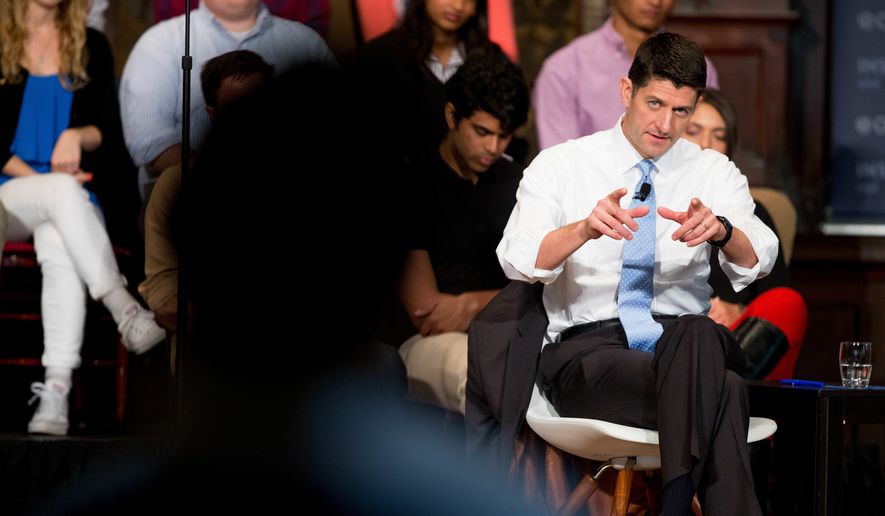OPINION:
A majority of Americans aren’t enthusiastic about a potential President Trump. Nonetheless, anger with the political establishment about political games and backroom deals, about insiders’ arrogance, and about fear that taxpayers will end up largely being saddled with the costs of these antics seems to be a driving force behind the pro-Trump movement.
This problem didn’t appear suddenly. It has developed over time. Rather than take steps to minimize the concerns of the American people, Washington insiders seem oblivious. Every day the reasons for such anger keep growing.
There is currently a rebellion on Capitol Hill over Washington’s proposal to deal with Puerto Rico’s financial crisis. The feds are pushing a bill that would give the territory new bankruptcy powers to avoid debts owed to bondholders. The tradeoff is that the elected leaders of Puerto Rico must cede control of their decision-making powers to a new control board similar to the one that Congress created for Washington D.C. 20 years ago.
Many leaders in the center-right community are worried that — unlike the process that rescued the nation’s capital — the Puerto Rico Oversight, Management, and Economic Stability Act is more than just a new fiscal board to address Puerto Rico’s years of profligacy and mismanagement. Last week the House Natural Resources Committee was set to approve a package that includes what many call “Super Chapter 9” bankruptcy for Puerto Rico, allowing it to restructure all of its debt, including its general obligation debt.
Leaders initially sought to move the measure through regular order — a public and transparent process wherein all voices could participate. However, when criticism of the measure couldn’t be overcome with amendments and other changes, a concerted effort from Republican leadership occurred seemingly to push the bill through with voice votes, even asking those in opposition to skip the vote. One congressman, John C. Fleming of Louisiana, was angry enough to go public in calling leadership out over the matter:
“In all my time in Congress, no one has ever asked me to do something quite like this, until last night. I was angry. To be asked to walk away — to be told to miss a vote — is a request that flies in the face of every member’s conscience. Leadership had no business making such a request.”
Why such an uproar?
The proposal sets a dangerous precedent that would violate the Puerto Rican constitution as well as create a new rationale for other local U.S. governments and localities to seek similar solutions. This is not the signal Congress should send to big-spending, heavily indebted states like New Jersey and Illinois. Perhaps most critically, the bill would shortchange bondholders, which would have an adverse effect on the retirement portfolios of average Americans.
It doesn’t stop with backroom deals and gag orders, though. Misdirection is also part of the plan. House Speaker Paul Ryan said recently in an op-ed the measure should not be referred to as a bailout since taxpayers would not be on the hook for “restructuring” Puerto Rico’s staggering $70 billion of debt. He’s partially right, but he left out a few important facts.
It is true that under Congressional Budget Office scoring protocols, changing the law to allow a control board to arbitrarily reduce or renegotiate existing debt obligations won’t be scored as a cost to the taxpayer. However, going forward new bondholders may refuse to invest in new bond offerings, or hold out for higher rates of return, which would cost taxpayers in the long run, and be harmful to the overall government bond market.
Any retroactive plan to renegotiate debt is antithetical to free-market principles. And by definition, if Puerto Rico is allowed to commit to terms up front and then get a pass when it comes time to pay, Puerto Rico is getting a bailout — one that Chicago and Detroit would envy.
Mr. Ryan enjoyed a honeymoon after agreeing to lead the House last year. That honeymoon may be at an end. For the last 20 years, he has prided himself as being an “ideas guy.” He wants the Republican Party to be the party of ideas again. If he wants to claim that mantle, however, he should first focus on reviving the trust of the voters and hold off on procedural shenanigans to push legislation that can’t be explained to voters or changed in a way that makes the legislation acceptable.
Or maybe it’s all part of his grand scheme to give voters yet another reason to vote for Donald Trump.
• Charles Sauer is president of the Market Institute.




Please read our comment policy before commenting.